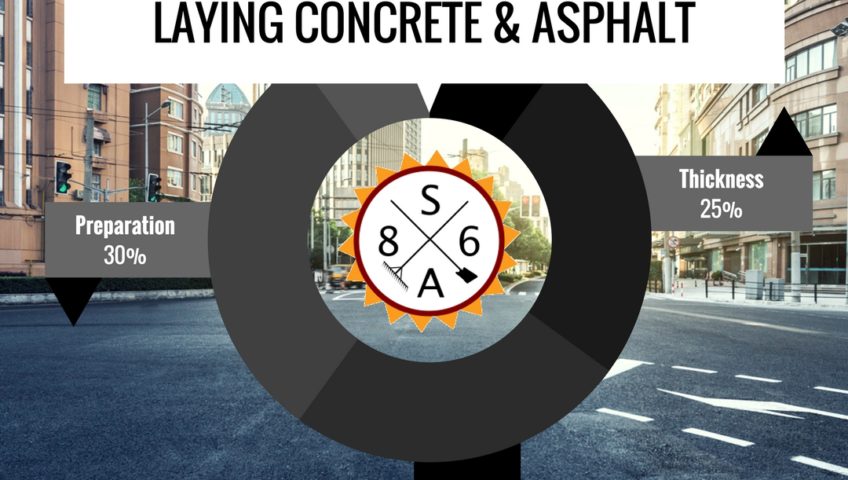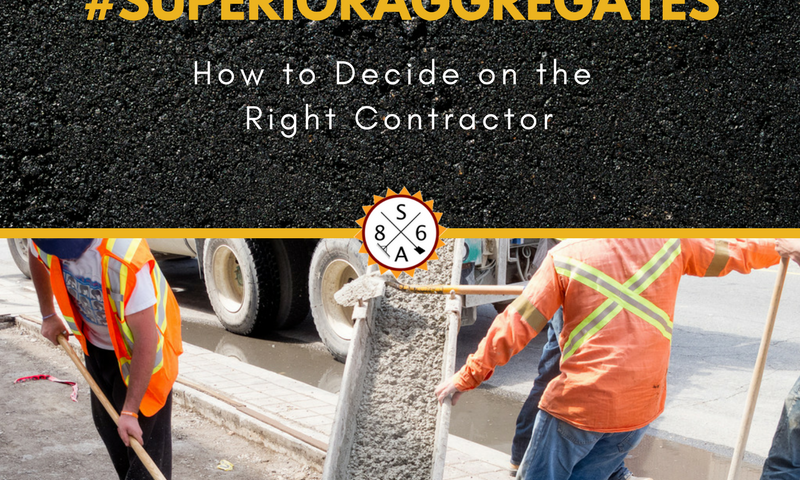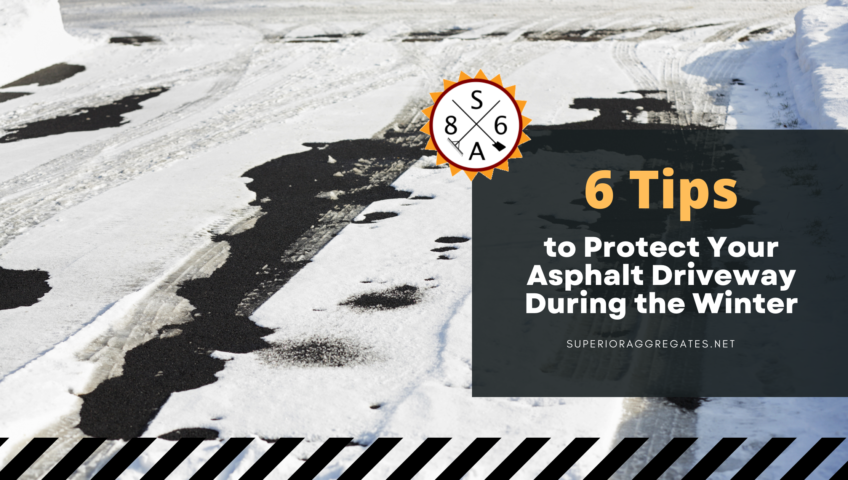
The process of laying concrete & asphalt
You may need concrete replacement or asphalt replacement. No matter how well-laid the surfaces are, they will eventually wear out. You also may need new asphalt or concrete on a substrate that previously did not have a prepared surface. This article will provide you with an easy to understand overview of these processes.
Laying Concrete & Asphalt: Preparing the Substrate & Remove the Existing Surface
The first step in laying both concrete and asphalt is to remove the existing surface. Obviously, if the surface is simply earth, this step is not necessary. However, many times when laying concrete and asphalt there is already a surface there. Removing the existing service often includes jackhammering it apart and removing it piece by piece. It is not as time-consuming as you might think, however.
Compact the Soil
Once the existing service has been removed, it is time to compact the soil. This will be the first step in the process if there is not already concrete or asphalt in the location where you’re laying the new surface. Compacting this soil may not seem like an important process to someone who is not familiar with laying concrete and asphalt. However, it is very important. It actually may be the most important part of the process. Properly compacting the soil will help ensure that the concrete or asphalt laid on top of it does not crack and does last a long time.
Cover Soil With Crushed Rock & Pack It (for Asphalt)
Once the soil has been properly compacted, the contractors will need to cover it with crushed rock and pack it tightly if they are applying asphalt. This step in the process is not necessary if concrete is being laid, but it is an integral part of the process for asphalt. This crushed rock substrate offers an excellent surface for asphalt to sit on top of. Just putting asphalt on top of the soil would not work because it would not adhere properly to the soil. This could lead to an unstable and even dangerous surface. Once the crushed rock has been applied, it must be packed. This is usually done with the roller vehicle. Next, the contractors will allow the soil to settle for roughly seven days.
Choose a Thickness
Before the concrete or asphalt can be laid, a thickness must be decided upon. The standard thickness ranges from one and a half to three inches. The decision is yours in the end, but it is highly recommended that you listen to the recommendation of the contractor you’re working with. They are highly experienced and trained professionals and they have done many similar jobs so they will know the thickness that will work best for your situation.
Pour the Surface
As you might have guessed, the next step is to pour the surface. Concrete can simply be poured out of a contract mr. into the ground and leveled out. Asphalt must be applied with the rocky material first and then that are on top of it. This makes a little more of an involved process, but it is not as time-consuming as you might expect.
Let the Surface Dry (Concrete) or Compact It (Asphalt)
Once the surface has been poured, it is time to let it dry, provided the surface is concrete. If it is asphalt, it does not take nearly as long to dry. However, it must be tightly packed to ensure that it is weather resistant.
Making the Right Decision for Your Asphalt and Concrete Needs
In many applications, getting a new asphalt or concrete surface can actually save you money. Residential and commercial asphalt resurfacing, for example, can be more expensive than replacement in some circumstances. Commercial and residential concrete maintenance can also be prohibitively expensive. Even concrete driveway repair expenses can add up.
You may need concrete replacement or asphalt replacement. No matter how well-laid the surfaces are, they will eventually wear out. You also may need new asphalt or concrete on a substrate that previously did not have a prepared surface. This article will provide you with an easy to understand overview of these processes.
Laying Concrete & Asphalt: Preparing the Substrate & Remove the Existing Surface
The first step in laying both concrete and asphalt is to remove the existing surface. Obviously, if the surface is simply earth, this step is not necessary. However, many times when laying concrete and asphalt there is already a surface there. Removing the existing service often includes jackhammering it apart and removing it piece by piece. It is not as time-consuming as you might think, however.
Compact the Soil
Once the existing service has been removed, it is time to compact the soil. This will be the first step in the process if there is not already concrete or asphalt in the location where you’re laying the new surface. Compacting this soil may not seem like an important process to someone who is not familiar with laying concrete and asphalt. However, it is very important. It actually may be the most important part of the process. Properly compacting the soil will help ensure that the concrete or asphalt laid on top of it does not crack and does last a long time.
Cover Soil With Crushed Rock & Pack It (for Asphalt)
Once the soil has been properly compacted, the contractors will need to cover it with crushed rock and pack it tightly if they are applying asphalt. This step in the process is not necessary if concrete is being laid, but it is an integral part of the process for asphalt. This crushed rock substrate offers an excellent surface for asphalt to sit on top of. Just putting asphalt on top of the soil would not work because it would not adhere properly to the soil. This could lead to an unstable and even dangerous surface. Once the crushed rock has been applied, it must be packed. This is usually done with the roller vehicle. Next, the contractors will allow the soil to settle for roughly seven days.
Choose a Thickness
Before the concrete or asphalt can be laid, a thickness must be decided upon. The standard thickness ranges from one and a half to three inches. The decision is yours in the end, but it is highly recommended that you listen to the recommendation of the contractor you’re working with. They are highly experienced and trained professionals and they have done many similar jobs so they will know the thickness that will work best for your situation.
Pour the Surface
As you might have guessed, the next step is to pour the surface. Concrete can simply be poured out of a contract mr. into the ground and leveled out. Asphalt must be applied with the rocky material first and then that are on top of it. This makes a little more of an involved process, but it is not as time-consuming as you might expect.
Let the Surface Dry (Concrete) or Compact It (Asphalt)
Once the surface has been poured, it is time to let it dry, provided the surface is concrete. If it is asphalt, it does not take nearly as long to dry. However, it must be tightly packed to ensure that it is weather resistant.
Making the Right Decision for Your Asphalt and Concrete Needs
In many applications, getting a new asphalt or concrete surface can actually save you money. Residential and commercial asphalt resurfacing, for example, can be more expensive than replacement in some circumstances. Commercial and residential concrete maintenance can also be prohibitively expensive. Even concrete driveway repair expenses can add up.


